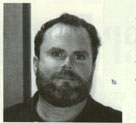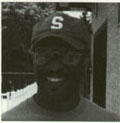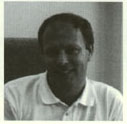FEATURE ARTICLE
staff members their contributions are valued and helps retain them as employees for years to come. As a people oriented manager, you need to continuously strive for worker satisfaction.
Steven Covey, best-selling author of The Seven Habits of Highly Effective People, says in a recent article: "As we head to a new millennium, jobs as we once knew them have been transformed. In some companies, there are no titles, no clear hierarchy. You are required to be not only an individual contributor, but also a team member and an innovator.

"I've always appreciated the open lines of communication.
The people I work with are open to my suggestions."
- Greg Jayne
Parks Foreman
(9-year employee)
Strengthening Teamwork
Employee Greg Jayne and others say that working for an agency that values teamwork is extremely important. A personal, relaxed and informal work environment enhances the ability to work together to produce results. When teams work well they accomplish more.
Recently, a Morton Grove Park District employee sought a position for advancement at another agency. The interviewer asked for examples when the employee didn't get along with a person in another department. After a pause, the employee responded: "I honestly can't think of any."
To this, the interviewer remarked: ""So let me get this straight: you work in heaven." It isn't heaven, but teamwork and congruency are a top priority at Morton Grove. Congruency means all people and departments must work together efficiently and effectively. We are only as good as our weakest link.
The board and staff are involved in planning for park and facility improvements as well as
developing marketing plans. This allows everyone to be a resource. Working together, we
are able to utilize everyone's special talents while giving and taking constructive feedback.
By involving everyone in the planning process, accountability and productivity are at an
all-time high. At times when unpopular decisions are made, these decisions are explained
honestly, which is vital in maintaining an atmosphere of teamwork and open
communication.

"The atmosphere is family-like, very supportive. The relationship between management and working staff is comfortable."
- Thomas Ingram
Staff Electrician
6-year employee
Fun in the Workplace
The social part of a strong workplace team allows employees to interact in a more casual environment. According to a November '97 Chicago Tribune article: "Many companies have a hard time figuring it out: Happy workers are productive."
Don't miss an opportunity to celebrate success. Surprise people by doing extra special things like a note of appreciation or a call of congratulations for the successful completion of a project. At final-time staff meetings, each employee is given an opportunity to share what is happening in their work area. Everyone's job duties are equally important at these meetings. A relaxed atmosphere instantly develops, allowing for some creative thinking, sharing of ideas as well as some rounds of applause for jobs well done. But most importantly these meetings are fun.
We take advantage of opportunities to take a field trip once in a while to see a product or facility in consideration at the district. Over the years our staff has helped out during the Plainfield tornado disaster and sent relief supplies to Iowa during the flooding. The satisfaction of helping others gives our team a stronger bond.
Finally, its OK to recognize things happening in people's personal lives. We don't pass up a chance to celebrate a birthday, a wedding, a new baby or a special holiday. Of course, our celebrations always include food! Also, we encourage family visitors, which staff appreciates because they are proud of their workplace and accomplishments.

"I especially enjoy the spontaneity of working with recreation people. This fun environment is not typically found in a finance department."
-David Erb
Finance Superintendent (4-year employee)
Getting a Difficult Person on Board
Cultivating a team spirit involves leading, instructing, coaching, communicating, listening, delegating, reporting, supporting and motivating. The key to a high rate of accomplishment is motivated people. When working with people, especially difficult ones, you need to take your time to build trust. Don't expect people to "buy into" change immediately. Expect to earn trust. Recognize small successes. How do you discuss the need for change with a difficult person?
· Clearly describe performance expectations.
· Outline behaviors you have observed.
· Let the employee be aware of consequences for performance.
· Prepare for and anticipate denial and defensiveness.
· Express confidence and set a date for a follow-up conversation.
· Discuss ways the organization can help.
Getting a difficult person on board pays big dividends when your investment turns the employee into a winner